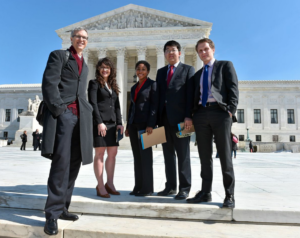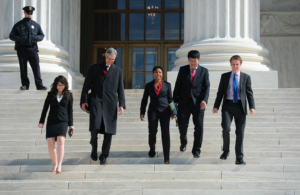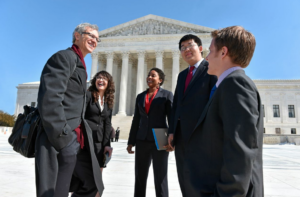SCOTUS Clinic Takes On Confrontation Clause in Ohio v. Clark

Professor Jeffrey Fisher and students from the Supreme Court Litigation Clinic took on the Constitution’s Confrontation Clause this week during oral arguments in the clinic’s case Ohio v. Clark. The Confrontation Clause guarantees all defendants in criminal prosecutions “the right . . . to be confronted with the witnesses against him.” At issue here is whether the prosecution in a child abuse case may introduce statements a child previously made to teachers alleging that the defendant abused him, without providing the defense any opportunity at trial to cross-examine the child.
“All we are asking for is that a state not to be allowed to have it both ways,” argued Fisher. “Introducing such evidence while at the same time prohibiting the defense from any form of confrontation whatsoever.”
The clinic represented the respondent in the case, Darius Clark, who claimed that a trial court violated his right to confrontation by allowing teachers to testify about the statements a three-year-old child in their preschool class made to them. The child’s statements constituted the only direct evidence that Clark, and not someone else, committed the abuse. An Ohio appeals court ruled that the teachers shouldn’t have been allowed at the trial to convey the child’s allegations, finding a violation of the Confrontation Clause. The case was then taken to the Ohio Supreme Court, which agreed with that ruling by a 4-3 vote. The State then took the case on to the Supreme Court-where it was argued on Monday.
Clinic students Morgan Weiland, JD ’15, Stephany Reaves, JD ’15, Percy Lee, JD ’15, and Michael Skocpol, JD ’16, under the guidance of Fisher, who argued the case, outlined and drafted the response brief on the merits. The group also traveled to Cleveland to meet with Clark and the local co-counsel.
“Meeting Mr. Clark reminded us of his great personal liberty at stake, and we remembered this throughout the experience,” said Lee.

Reaves echoed Lee’s sentiments, “By now, as students, we’ve become emotionally invested in Mr. Clark’s case—and know the facts and legal issues so well,” said Reaves. “It was great to have the opportunity to see the case through to the oral argument.”
The clinic students worked full-time on the case during the fall quarter—even leading a workshop with other Supreme Court Clinic students to receive feedback at various phases. It was Fisher’s, they say, that was most impactful.
“Jeff is equal parts appellate advocate and teacher,” said Weiland. “After we mooted the case, we reviewed argument substance and strategy —and even then, just days before the argument, he focused on illuminating the craft and method of appellate advocacy to teach us how to use these tools for ourselves and our future clients.”
“The student team did an outstanding job working through a very difficult legal problem,” said Fisher. “And there’s nothing for them quite like seeing all of those hours of hard work come to life in thoughtful dialogue with the Justices.”
And it was that thoughtful dialogue that students say they won’t soon forget.
“It was thrilling to have Justices point out parts of our brief or highlight an argument and think, “Hey, I worked on that!” said Weiland.
“I was surprised by how nerve-racking it felt to watch the arguments,” said Skocpol.

“We were all remarking as a team afterward that even though all we did was sit in the audience, our adrenaline was still pumping several hours later. It’s one thing to go to the Court and hear interesting intellectual issues being debated, but it’s quite another when you’re there and you’ve got a client, and you care about him, you’ve been pouring your heart into his case, and he’s got thirty years of his life riding on the arguments. We all really felt the stakes for Mr. Clark in there.”
The Court’s opinion in Ohio v. Clark is expected to be issued later in the term. You can read the oral arguments from the case here.
